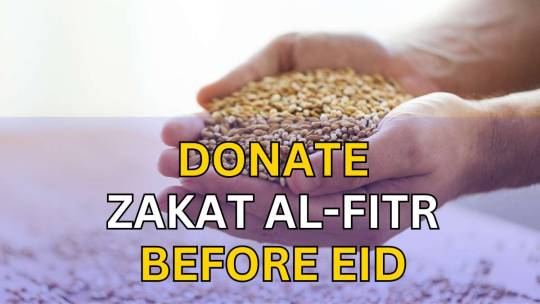#ZAKAT AL-FITR
Text
𝗧𝗛𝗜𝗡𝗚𝗦 𝗬𝗢𝗨 𝗡𝗘𝗘𝗗 𝗧𝗢 𝗞𝗡𝗢𝗪 𝗥𝗘𝗚𝗔𝗥𝗗𝗜𝗡𝗚 𝗭𝗔𝗞𝗔𝗧 𝗔𝗟-𝗙𝗜𝗧𝗥
https://www.instagram.com/s/aGlnaGxpZ2h0OjE4MzMzNTg2MDQyMTE0NTcy?igsh=MTRxd3FneGpqcHVqMw==
5 notes
·
View notes
Text
Eid al-Fitr Mubarak!
Happy Eid al-Fitr – عيد الفطر to all Muslims!
Image taken from Internet
Eid al-Fitr marks the end of Ramadan, the Islamic holy month of fasting.
Muslims around the world celebrate Eid al-Fitr, also known as the “Festival of Breaking the Fast,” with a spirit of renewal, gratitude, and community. It’s a time to reflect on the spiritual growth achieved during Ramadan and to share blessings with…

View On WordPress
#Celebration#Eid al-Fitr#Eid Mubarak#end of Ramadan#fasting#Muslim#Raffaello Palandri#Ramadan#tradition#Zakat al-Fitr
2 notes
·
View notes
Video
youtube
Fitrah! How To Pay The Fitrah? Abdur Razzak Bin Yousuf | Nasir Media
#youtube#bangla waz#bangla waj#islamic#islam#fitr#fitra#zakat al-fitr#zakat fitrah#abdur razzak#bangladesh#saudi arabia#waz#pakistan#india#kuwait#oman#uae
0 notes
Text
Ramadan: Ever best Spiritual method for weight loss.

#Ramadan Mubarak#Islam#Muslim#Holy month#Fasting#Prayer#Quran#Sawm#Iftar#Suhoor#Taraweeh#Laylat al-Qadr#Eid al-Fitr#Zakat al-Fitr#Charity#Community#Forgiveness#Reflection#Self-discipline#Patience#Gratitude#Spiritual growth#Family#Unity#Peace#Ramadan fasting tips#Ramadan recipes#Suhoor meal ideas#Iftar meal ideas#Ramadan prayers
0 notes
Text
How Much Is Zakat al-Fitr? | Donate ZAKAT AL-FITR Before EID
ZAKAAT AL-FITR
Narrated Abu Stated Al-Khudri (رضي الله عنه) : Within the lifetime of Allah’s Apostle, we used to provide one Sa’ of meals (edible issues) as Sadaqat-ul-Fitr (to the poor). Our meals was both of barley, raisins (dried grapes), cottage cheese or dates. (zakaat al fitr)[Narrated by SAHIH AL-BUKHARI: 1510]
IS ZAKAT AL-FITR THE SAME AS ZAKAH?
No, they’re totally different. Zakat…

View On WordPress
#DONATE ZAKAT AL-FITR BEFORE EID#fitr zakat rules#Fitra Amount#How much do you pay Zakat al-Fitr?#How much does Fitra cost?#How much is Zakat al-Fitr in India?#how much is zakat ul fitr per person#importance of zakat al-fitr#is zakat al-fitr obligatory#What is Fitra money?#zakat al fitr amount#Zakat al-Fitr#zakat al-fitr calculator#zakat al-fitr hadith#zakat al-mal
0 notes
Text
What is Zakat al Fitr?
The Messenger of Allah (peace be upon him) ordained Zakat ul Fitr [Fitrana] to purify the fasting person from indecent words or actions,
... and to provide food for the needy.
[Sunan Ibn Majah 1827]
The quantity is described by the Prophet (PBUH) as 1 saa’ of food, and 1 saa’ is equivalent to 4 madd.
A madd is the amount that can be scooped up when one puts their hands together.
Fitrana must be paid before the Eid prayer. However, if paid after it will be treated as Sadaqah
#yarasulallah#rasoollah#ZakatUlFitr#zakatfitrah#fitrana#fitra
#naat#naatshareef#naatstatus#trending#trendingreels#trendinnaat#reelsinstagram#reels#reelslife#reelitfeelit
#newtrend#explorepage#explore#islamicstatus#islamicquotes#instagramreel#inshallah
#MashaAllah#subhanallah
#ramzanmubarak#rasullullah#ramzan_kareem#zakat
#zakat#zakat fitrah#zakat al fitr#alhamdulillah#islam#prophet muhammad#allah#muslim#quran#hadith#prophet#badan amil zakat nasional#islamicpost#dua#ramadan mubarak#ramadan#ramadan kareem#ramadan 2024#eid#eid mubarak#eid ul fitr
16 notes
·
View notes
Text
Learn everything you need to know about Sadaqat al-Fitr in our latest blog post! Our comprehensive guide covers the importance of this charitable tradition, along with practical tips for giving locally and verifying recipients. We also explore the role of Zakat and fasting in Islamic tradition, drawing on Hadith and modern scholarship to provide a complete picture of this important aspect of Ramadan. This post is packed with insights and advice to help you give with sincerity and impact. Check it out today and join the Muslim community in this important act of charity!
#Sadaqat al-Fitr#Zakat#Charity#Fasting#Ramadan#Eid al-Fitr#Islamic tradition#Hadith#Modern scholars#Practical tips#Giving locally#Islamic guidelines#Verification of recipients#Sincerity#Muslim community
0 notes
Link
0 notes
Text
Waki’ ibn al-Jarrah رحمه الله said:
“Zakat al-Fitr is to the month of Ramadan like the prostration of forgetfulness is to prayer.
It makes up for deficiencies in fasting just as the prostration makes up for deficiencies in prayer.”
[al-Majmoo’ Sharh al-Muhadhab 6/140]
#islam#religion#muslim#sayings of the salaf#sunnah#quranandsunnah#salaf#islamic reminders#islamicquotes#islamicreminders
36 notes
·
View notes
Text
Eid al-Fitr Day To do list:
1- Recite Takbir from Maghrib on last day of Ramadan until Eid.
Allaahu Akbar, Allaahu Akbar (Allahu Akbar), laa ilaaha ill-Allaah, Allaahu Akbar, Allaahu Akbar (Allahu Akbar), wa Lillaahi’l-hamd
You can say Allahu Akbar 2 or 3 times, both are permitted.
2- To do ghusl, some of the salaf used to do this.
3- Use Miswaak
4- Adorn yourself in your best clothes whilst ensuring modesty
5- Apply perfume (men only)
6- Head out to the place of Eid prayer early and eat an odd number of dates before you do.
7- Give Sadaqah al Fitr (Zakat al Fitr) before the Eid prayer.
8- Walk to the place of Eid prayer and return from it with a different route
9- Listen to the Khutbah after the prayer
10- Greet each other and congratulate each other:
تقبل منا ومنكم
Taqabbal Minna wa Minkum
“May Allah accept from us and from you.”
#islam#quote#allah#hijab#knowledge#inspirational quotes#islamicadvice#islam4 life#jilbab#la ilaha illa allah#islamicreminders#islamicart#islamicquotes#islamic#muslim revert#muslim#muslimah#muslim reminder#eid mubarak#eid
12 notes
·
View notes
Text
any recommendations for zakat al fitr? preferably for palestine, yemen and sudan. thank you <3
14 notes
·
View notes
Text
Embracing the Radiance of Ramadan: A Journey of Spiritual Enrichment

Fasting and Prayer: A Symphony of Devotion
In the sacred month of Ramadan, Muslims around the world engage in fasting from dawn to sunset, abstaining not only from food and drink but also from negative behaviours. The act of fasting is not merely a physical challenge; it is a profound spiritual journey, fostering self-discipline, empathy, and a heightened awareness of one’s actions.
Quran (2:183) — “O you who have believed, decreed upon you is fasting as it was decreed upon those before you that you may become righteous.”
The Health and Spiritual Benefits of Fasting: Nourishing the Body and Soul
Beyond its spiritual significance, fasting during Ramadan offers a myriad of health benefits. The detoxification of the body, improved mental clarity, and enhanced self-control contribute to both physical and spiritual well-being. It’s a holistic approach to rejuvenation and self-improvement.
Hadith (Sahih Bukhari) — “Fasting is a shield; so when one of you is fasting, he should neither indulge in obscene language nor should he raise his voice in anger.”
Zakat ul Fitr: Illuminating Paths of Compassion
An integral aspect of Ramadan is the Zakat ul Fitr, a charitable donation given before Eid al-Fitr. This act of giving is a means by which Islam actively addresses poverty and inequality. It ensures that those less fortunate can also partake in the joyous festivities of Eid.
Hadith (Sahih Bukhari) — “The fast remains suspended between Heaven and Earth until the Sadaqat al-Fitr are paid.”
Ramadan Traditions Around the World: Unity in Diversity
Ramadan is not only a personal journey but a global celebration. Traditions vary across cultures, enriching the tapestry of this holy month. From communal iftar gatherings for Muslims and non-Muslims alike to the vibrant lights adorning streets, Ramadan fosters a sense of unity, bringing Muslims together worldwide.
In the month of Ramadan, the beauty of Islam shines brightly, offering a path of self-discovery, compassion, and unity. It extends an invitation not only to Muslims but to people of all backgrounds to witness the profound spirituality, generosity, and cultural richness that characterise this sacred month.

#islamicreminders#islamdaily#islamic#allah#quran#islamiyet#muslim#islam#mosque#new article#new blog#ramadan#muslim fashion#duaa#muslims
7 notes
·
View notes
Text
Narrated Abu Sa`id Al-Khudri:
We used to give one Sa' of meal or one Sa' of barley or one Sa' of dates, or one Sa' of cottage cheese or one Sa' of Raisins (dried grapes) as Zakat-ul-Fitr.
يَقُولُ كُنَّا نُخْرِجُ زَكَاةَ الْفِطْرِ صَاعًا مِنْ طَعَامٍ، أَوْ صَاعًا مِنْ شَعِيرٍ، أَوْ صَاعًا مِنْ تَمْرٍ، أَوْ صَاعًا مِنْ أَقِطٍ، أَوْ صَاعًا مِنْ زَبِيبٍ.
Sahih al-Bukhari 1506
6 notes
·
View notes
Text
The prophet صلى الله عليه وسلم obligated zakat al fitr from Ramadan a saa’ from dates or a saa’ from wheat on every slave or free person, every man and women, young and old from the Muslims.
قال النبي صلى الله عليه وسلم
The prophet peace and blessings be upon him said;
( زكاة الفطر طهر للصائم من اللغو والرفث وطعمه للمسكين
Zakat al fitr is a purification from vain talk and misbehavior and it is food for the poor
فمن اداها قبل الصلاة فهي زكاة مقبولة
whoever gives it before the salah of Eid then it is accepted as zakat
ومن اداها بعد الصلاة فهي صدقة من الصدقات
And whoever gives it after the salah of Eid then is is sadaqah, voluntary charity
رواه ابو داود
23 notes
·
View notes
Text
DAILY DUA
Dua and remembrance before sleeping #2
ٱللهُ لَآ إِلَـٰهَ إِلَّا هُوَ ٱلْحَيُّ ٱلْقَيُّومُ لَا تَأْخُذُهُ سِنَةٌ وَلَا نَوْمٌ لَّهُۥ مَا فِى ٱلسَّمَـٰوَٰتِ وَمَا فِى ٱلْأَرْضِ مَن ذَا ٱلَّذِى يَشْفَعُ عِنْدَهُۥۤ إِلَّا بِإِذْنِهِۦ يَعْلَمُ مَا بَيْنَ أَيْدِيهِمْ وَمَا خَلْفَهُمْ وَلَا يُحِيطُونَ بِشَيْءٍ مِّنْ عِلْمِهِۦۤ إِلَّا بِمَا شَآءَ وَسِعَ كُرْسِيُّهُ ٱلسَّمَـٰوَٰتِ وَٱلْأَرْضَ وَلَا يَئُودُهُۥ حِفْظُهُمَا وَهُوَ ٱلْعَلِيُّ ٱلْعَظِيمُ (٢٥٥)
Translation
Abu Huraira said, "The messenger of Allah (may the peace and blessings of Allah be upon him) put me in charge of the Zakat of Ramadan (i.e. Zakat-ul-Fitr). Someone came to me and started scooping some of the foodstuff of (Zakat) with both hands. I caught him and told him that I would take him to Allah's messenger (may the peace and blessings of Allah be upon him)." Then he (Abu Huraira) told the whole narration and added , He (i.e. the thief) said,, “When you are about to sleep recite ayat-al-kursee (The verse of the foot-stool, Surah Baqarah 2:255) till the end of the verse for there will remain over you a protection from Allah and no devil will draw near to you until the morning.”, the messenger of Allah (may the peace and blessings of Allah be upon him) (upon hearing this) said: "He (i.e. the theif) told the truth even though he is a habitual liar, he was a shaytan"
Allâh! Lâ ilâha illa Huwa (none has the right to be worshipped but He), the Ever Living, the One Who sustains and protects all that exists. Neither slumber, nor sleep overtake Him. To Him belongs whatever is in the heavens and whatever is on earth.
Who is he that can intercede with Him except with His Permission. He knows what happens to them (His creatures) in this world, and what will happen to them in the Hereafter. And they will never compass anything of His Knowledge except that which He wills.
His Kursee extends over the heavens and the earth, and He feels no fatigue in guarding and preserving them. And He is the Most High, the Most Great.
N.B. This verse is famously known as "Ayat Alkursee/Alkursi" or "the Verse of The Footstool"
Transliteration
allaahu laa ilaaha illaa huwal-ḥayyul-qayyoom, laa ta’khudhuhu sinatun wa laa nawm, lahu maa fis-samaawaٰti wa maa fil-arḍ, man dhal-ladhee yashfa‛u ‛indahu illaa bi’idhnih, ya‛lamu maa bayna aydeehim wa maa khalfahum, wa laa yuḥeeṭoona bishay’in min ‛ilmihi illaa bi maa shaa’
wasi‛a kursiyyuh-us-samaawaٰti wal-arḍ, wa laa ya’ooduhu ḥifẓuhumaa wahuwal-‛aliyyul-‛aẓeem
Sources: Bukhari No# 2311, 3275, 5010; At-Tirmidhi No# 2880
#dua#allah#islam#muslim#quran#god#muslimah#revert#convert#reverthelp#revert help#converthelp#revert help team#revert islam#convert islam#islam help#pray#prayer#help#salah#hijab#reminder#religion#muhammad
2 notes
·
View notes